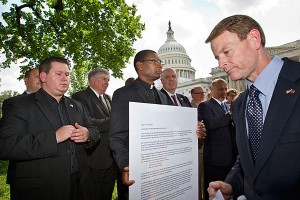A diverse group of pastors and parishioners now stand in front of the Supreme Court. They claim to know the same God. They also hold radically different views on the kind of relationships that God approves.
This situation resembles the one President Abraham Lincoln described in his celebrated second inaugural address. Discussing the different views of slavery among religious adherents in the North and South, Lincoln said, “Both read the same Bible, and pray to the same God; and each invokes his aid against the other.”
He could have said the same thing today.
What Does God Think?
Like Lincoln, I have a view on which is right. But that is not my concern here. What concerns me now is the audacity to believe we human beings can know precisely what God thinks. All we know, as Lincoln pointed out in the same address, is that “The Almighty has his own purposes.”
This is not to say that we cannot or should not take political stands driven by our faith. Many of the transformative movements in American history have emerged out of religious commitment. As Lincoln later says, we need to act with “firmness in the right, as God gives us to see the right.”
The danger is when we lose humility. When we became so firm in grip of our knowledge of the right that our hands become frozen. When that happens, we become so polarized that conversation ends and anger dominates.
The Humility Our Country Needs
One of President Obama’s great qualities as a leader–what catapulted him into the public spotlight in his 2004 Democratic National Convention address–is his ability to see and articulate multiple points of view. It is the quality of humility that allows him to say with conviction that those with whom he disagrees have legitimate, even compelling, points of view.
Sadly, the political world today seems unable to handle any degree of humility. The God of politics eschews nuance and demands strident statements to appeal to the base and raise money.
Can we religious leaders do any better? We must. We would not be true to our faith if we did not. Indeed, the great Catholic teacher Thomas Merton put it well when we pointed out that faith is impossible without humility:
It is almost impossible to overestimate the value of true humility and its power in the spiritual life. For the beginning of humility is the beginning of blessedness and the consummation of humility is the perfection of all joy. Humility contains in itself the answer to all the great problems of the life of the soul. It is the only key to faith, with which the spiritual life begins: for faith and humility are inseparable. In perfect humility all selfishness disappears and your soul no longer lives for itself or in itself for God: and it is lost and submerged in Him and transformed into Him.
How Humility Can Save Our Country
In today’s world, what would that humility look like?
1. Do not pretend to know what God believes: A great medieval rabbi said that “If I knew God, I would be God.” We are human beings. We can study and attempt to arrive at our best understanding of God’s will. And we can and should live and act on what we discover. But we cannot pretend that we are privileged to know exactly what God believes.
2. Argue with civility: We do not gain points by pushing another down. Rather, we gain respect when listening, understanding and responding thoughtfully to an opponent’s point of view.
The ancient Jewish sages had a phrase for this type of discussion. They called it “argument for the sake of heaven.” To put it in non-religious language, we can and should question one another in pursuit of the common good. We can not and should not dismiss another person’s point of view simply because it does not accord with our faith.
3. Focus on the ideals we share: Lincoln ended his inaugural address with a stirring appeal to the North and the South. “With malice toward none; with charity for all,” he said, “with firmness in the right, as God gives us to see the right, let us strive on to finish the work we are in; to bind up the nation’s wounds; to care for him who shall have borne the battle, and for his widow, and his orphan–to do all which may achieve and cherish a just and lasting peace among ourselves, and with all nations.”
Whatever the Supreme Court decides this summer will anger a large portion of our population. The task of the faithful will not then be to demonize the other or revel in their victory or sense of righteousness. It will be to honor the humanity of every human being, and to work for peace in our polarized country.
To receive Rabbi Moffic’s weekly digest of Jewish wisdom, click here.


